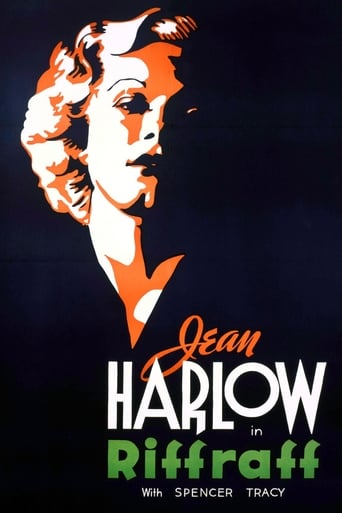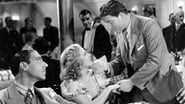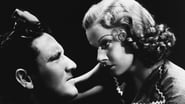talisencrw
Though this is incredibly dated, it's also a very sincere and bizarre cross between a rags-to-riches drama and social commentary on unfair work practices/rights of workers/unions. And just so fans could see sexpot starlet Jean Harlow (the film's from Warner Archives' 7-film boxed set put out for the recent 100th anniversary of her birth in 1911) in as many costumes and gowns as possible, they have her married and involved in romances not simply with strait-laced activist Spencer Tracy but also their rich, slimy boss, tuna cannery owner Joseph Galleia (most famous in 'Touch of Evil' and 'Gilda'). Women loved her because she was lippy, brazen, glamorous, loyal and had a heart of gold, and men loved her because...she was Jean Harlow. This also sports an early appearance by Mickey Rooney in comic relief as her 15-year-old punk nephew; hard to belief he had already spent 10 years by that time on the silver screen! Not the worst film you would ever see, and her charisma with both starring actors is extraordinary. If you're a fan of either Harlow or 30's drama, don't miss it for the world.
vincentlynch-moonoi
There's a certain time in the late 1930s when, in my view, movies come of age. This film does have some substance, although it is not quite of that very slightly later Hollywood when films became "modern". And, the same can be said of Spencer Tracy (one of my two favorite actors; the other being Cary Grant). This was the film just before his breakout role in "Fury" and a series of truly impressive starring roles. This is the Tracy that seemed to feel he had to yell to make a point (or was that the direction he was receiving?). He hadn't quite learned what I'll refer to as simmering-subtlety. Nevertheless, Tracy has his moments in this film.Jean Harlow is impressive, even without her platinum blond hair. You'll recognize quite a few of the supporting actors (including Una Merkel and a young Mickey Rooney). I was interested to see Joseph Calleia as the bad guy here...a common role for him at the time, although I remember him best as the papa from the Martin & Lewis film "The Caddy" more than a dozen years later. Although not a large role, there's a strong performance by supporting actor J. Farrell MacDonald (if you watch old movies, you'll recognize him, although you probably never knew his name).The portion of the film that is most interesting is about midway through. After we learn that the major characters are sort of low class yellers, and after Tracy and Harlow split, it's the scene at the hobo camp that brought real substance to the movie...quite touching. And speaking of the hobo camp, it's a reminder that this film was made right in the middle of the Great Depression, and its depiction of labor unions is quite impressive. But then the film once again sinks into that pre-GWTW immaturity that I spoke of earlier. Harlow steals money from the bad guy to help Tracy, gets caught, goes to womens' prison, escapes through a drain pipe in the middle of a thunderstorm, at about the same time that the poor night watchman at a dock (Tracy) saves the union workers' jobs by foiling a sabotage attempt (why was there such an attempt by hobos???). Yes, it gets kinda dumb, and oh, I forgot to mention that while in prison, Harlow has a baby which nobody tells Tracy about. And believe it or not, despite Harlow breaking out of prison, they all live happily ever after. Dumb, dumb, dumb...but somewhat entertaining!
blanche-2
"Riffraff" stars Spencer Tracy in an odd role for him and the lovely Jean Harlow as his wife in a story involving the tuna fishermen set, unions, prison, hobos and the like. It's a true potboiler with Harriet (Harlow) sacrificing everything for her man, an egotistical, bombastic fellow named Rudolph Muller. He's determined to make good but his stubbornness and big mouth get in the way.Tracy is ill-suited for this role, though at the time, he was mainly playing character roles, and this certainly is one. But the actor comes off as too smart to be playing such a dumb lug. A year later, his stock at MGM would begin to rise, and he would transition out of this type of role into leading man parts as Bogart did. Tracy is much better in the second part of the film, where he's called upon to show his emotive range, than in the first part where his character is established.Though Harlow plays a cannery worker turned wife, she still gets to be glamorous in a couple of scenes where the big boss, Nick (Joseph Calleia) takes her out. Harlow comes off tough and streetwise enough to be right for the role, and she does it well. Actually, she seems more comfortable than Tracy. MGM at that point was trying to expand the range of this incredibly popular actress. The film was made in 1935, and of course, by 1937 she would be dead, but not before doing another -- and far superior - film with Tracy, "Libeled Lady." All in all, there's nothing special about "Riffraff" except the two stars, but Tracy and Harlow were always special, so it's worth a look.
lugonian
RIFFRAFF (MGM, 1935), directed by J. Walter Ruben, stars Jean Harlow, as Hattie who lives by the waterfront with her married sister, Lil (Una Merkel), her husband (William Newell) and their kids, Jimmy and Rose (Mickey Rooney and Juanita Quigley). She works as a tuna-cannery worker for Nick Lewis (Joseph Calleia), but her real interest is Dutch Muller (Spencer Tracy), a loudmouthed, conceited fisherman. Although she pretends to hate him, she keeps his picture in her room and follows him about. During a festivity, she proves herself lucky for him at the gambling tables, causing him to dump his beauties and change his interest towards her. Eventually they wed, becoming the typical married couple, constantly yelling and screaming at one another, usually saying things for which they mean the opposite. After Dutch rises from fisherman to union leader, he becomes responsible for a strike that causes many men, he included, to be out of work for a length of time. Being more concerned about his pride than his wife and those who look up to him, Dutch deserts. When Hattie learns of Dutch being sick and living amongst homeless bums, she steals some money from Nick to give to Dutch. Because of this, she's arrested. While serving time in prison, Dutch takes time to think things over, unaware that Hattie is not only serving time for his sake, but has given birth to his child.Although both Jean Harlow and Spencer Tracy have appeared in better screen material during their careers, RIFFRAFF ranks one of the most televised of their films, particularly during the golden age of local television late shows of the 1960s and '70s. It has even been a viewer's request at one time or another on Turner Classic Movies. Yet, it's not as well known as Harlow's DINNER AT EIGHT (1933), or Tracy's CAPTAINS COURAGEOUS (1937), to name a few. Not that RIFFRAFF is a good or a bad film, but actually a total departure for both its stars. Yes, Harlow has played tough gals before, and handled her men with kid gloves, but due to the production code that went into affect in 1934, she still played it tough but a little more tamed.On the comedic side, Dutch and Hattie start arguing right off after exchanging their vows, and politely smile and act as nothing's wrong in front of their wedding guests. Then there's the accented Joseph Calleia, whose double-talk along with another accented character actor, George Givot, add to the lighter moments, as well as Calleia delivering such a line following a big rumble, "I'm Okay, but I don't feel so good." A current hit tune, "You Are My Lucky Star," first introduced in Broadway MELODY OF 1936 (MGM, 1935), is plugged here, sung by a quartet during the party scene.The supporting cast includes Vince Barnett as Flytrap; Paul Hurst as Belcher; Roger Imhoff as Hattie and Lil's drunken father, Pop; Lillian Harmer, Helene Costello, among others. In a notable performance is J. Farrell MacDonald as Brains, the more logical character in the story who plays his role as a soft-hearted union man with strong human quality. There is a scene in which the peaceful Brains tries to talk some sense into Dutch, and gets his face slapped for his trouble.The central focus here is Spencer Tracy, a new resident to MGM, making his fourth appearance for the studio. Up to this point, MGM wasn't sure how to use Tracy. His Dutch Muller character is so unsympathetic, so conceited, and as the title indicates, a "Riffraff." Yet, it's a wonder how Tracy succeeded in getting the audience sympathy. Aside from all the yelling and screaming to either add tension to the drama or lighter moments in comedy, RIFFRAFF also includes many extras, many crowd scenes to go around.The acting is satisfactory, although Harlow, criticized as being a very bad actress at the time, was improving with each passing film. Her most notable weak spot in RIFFRAFF is the scene in prison where she must surrender her infant baby to her sister Lil. It might have worked had Harlow been given a little more direction in doing this scene with more conviction. She does, however, work well with Tracy, making his second of three movies opposite her.Although set on the waterfront locale, Harlow is the only female character in the story with a more glamorized look. Character actress Una Merkel, as her sister, Lil, plays her role with more believability and conviction, wearing second hand clothes, hair unsoiled and minus facial makeup. But viewers and MGM couldn't accept or present Harlow on screen looking like a second-rate character, even in poor man's settings.RIFFRAFF, which was available on video cassette in the 1990s, is a worthy look at an early film with future stars on the rise, particularly both Tracy and Mickey Rooney, who would appear together in BOYS TOWN (1938) and its sequel, MEN OF BOYS TOWN (1941), as well as Jean Harlow at the prime of her movie career before death took a toll in 1937 at the age of 26. (***)





